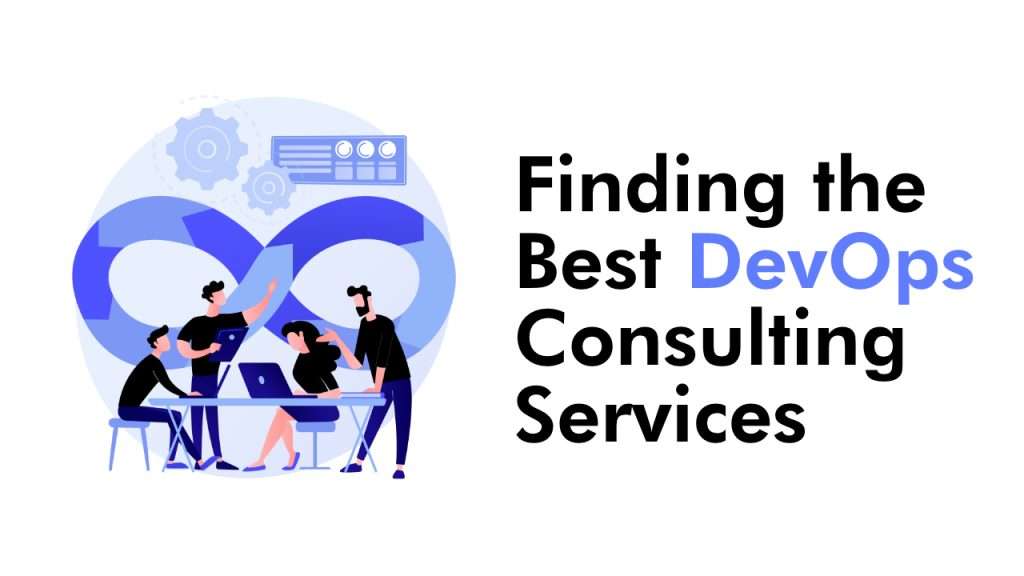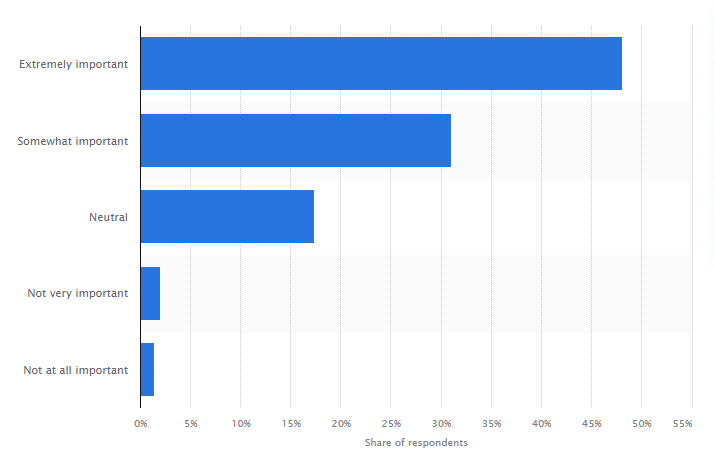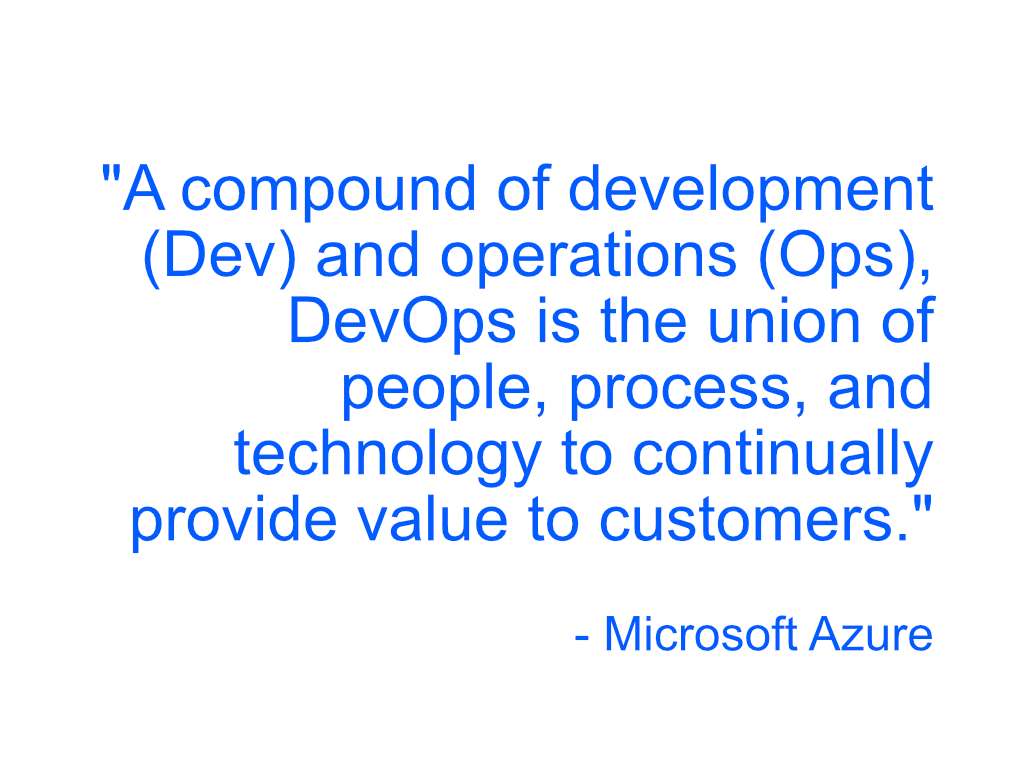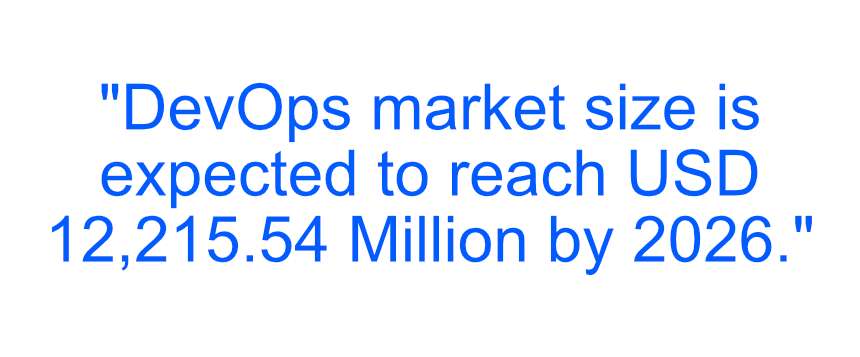MODIFIED ON: November 29, 2022 / ALIGNMINDS TECHNOLOGIES / 0 COMMENTS


DevOps consulting services are becoming popular day by day. The estimated value of the global DevOps market was USD 4,311.95 Million in 2020. It is expected to cross USD 5,114.57 Million by the end of this year. Considering a Compound Annual Growth Rate (CAGR) of 18.95%, experts have forecasted that the value will reach USD 12,215.54 Million by 2026.
The reason why DevOps has become so popular is that it promotes a culture of trust and risk-sharing between team members. It motivates teams to continuously work together, experiment and shares knowledge to reach a common goal, i.e., make a software product ready as quickly and efficiently as possible.

The statistic shows the importance of DevOps in scaling software development. Courtesy: Statista
As it promotes team play and encourages communication and mutual support, the uncertainty regarding the quality of the end product is minimized. As a result, so many businesses are adopting DevOps at a fast pace to eliminate uncertainty and improve the quality of their products.
What is DevOps?
AWS by Amazon defines DevOps as
“DevOps is the combination of cultural philosophies, practices, and tools that increases an organization’s ability to deliver applications and services at high velocity: evolving and improving products at a faster pace than organizations using traditional software development and infrastructure management processes. This speed enables organizations to better serve their customers and compete more effectively in the market.”
Microsoft Azure defines DevOps as
“A compound of development (Dev) and operations (Ops), DevOps is the union of people, process, and technology to continually provide value to customers.”
The above definitions make it clear that DevOps is not just a method or technique. Rather, it is a combination of principles, practices, methodologies, values, and philosophies that are shared between teams to help them achieve a common goal of creating software with maximum value.

Benefits of DevOps
DevOps offer so many benefits to a business. But what makes DevOps more popular is how crucial these benefits are to a business.
High collaboration
Communication between teams is crucial when developing a product. Developing a web or mobile application is not a simple process. It involves a set of processes such as market study, product conceptualization, product designing, development, deployment, and maintenance. The quality of the final product will depend on the level of mutual collaboration, communication, and integration across various teams who are part of the whole process.
DevOps encourages an environment where the boundaries between each team are reduced. There is a free flow of information and mutual support between teams to ensure that the quality is maintained at each stage of product development. Did your IT team have to send back the module your development team had worked tirelessly for the last few months as there was a conflict between the code and the deployment environment? DevOps will save you next time!
Early conflict detection
DevOps encourages knowledge sharing between teams. Each team will have a clear idea of what must be done and what are the requirements at each stage. These requirements are clearly communicated to other teams. The automated, continuous monitoring along with rigorous testing eliminates the chances for any conflict. And even if a problem arises, it is identified and mitigated in the initial stage itself.
Innovation
DevOps promotes collaboration between teams. When a group of talent comes together, the chances of finding something disruptive is much bigger.
Also, DevOps streamline the whole process of product development starting from market study to deployment and maintenance. The roadmap, automation, rigorous testing, and continuous monitoring help with eliminating extra work and reworks. The teams are more relaxed and there is a good work-life balance that promotes a fresh mindset and innovative thinking.

Faster delivery time
Automated processes, an environment that discourages conflict, quick feedback cycle and continuous delivery models help with transforming software development into a smooth and fast process. Effective communication and continuous testing ensure that quality is not lost in any stages. As conflicts and rework are less to nil, the projects are completed within deadline and with maximum efficiency.
Better quality
From the above points, it is clear that DevOps directly improve the quality of the end product. Rigorous and continuous testing, mutual collaboration, effective communication, continuous feedback cycle and automation are a few of the many factors that contribute to the quality of the product.
Reduced cost
Most businesses wonder whether they can afford DevOps services. This doubt arises from the misunderstanding that the budget can be reduced without affecting the list of features or quality of a product. Chances are, if you are opting for the traditional development process, the cost may increase due to conflicts and reworks. You may end up spending more than forecasted.

DevOps consulting services
To get all the benefits of DevOps, you must find the right DevOps consulting company. However, finding the right one may seem difficult due to the variety of options available in the market. Also, there are certain parameters you must check while choosing a DevOps consulting service. These factors not only help you to find the best DevOps consulting company but also you will be hiring the right one for your requirement.
Finding the right DevOps consulting company
Here is a list of things to check while hiring a DevOps consulting firm.
Identifying your requirement
The first step in choosing a DevOps consulting firm is to identify your requirement. Ask yourself questions like
- What are your requirements
- How are you planning to meet these requirements?
- What is the available solution for your requirements?
- What are the pros and cons of each available solution?
- Which are the solutions that match your budget and timeline?
For example, if your requirement is to develop a complex product that demands certain technical expertise and faultless implementation, hiring a DevOps expert will be better than hiring a full stack developer.
If you are planning to hire an external agency instead of hiring a team in house, DevOps will be a better choice since it offers a robust feedback cycle along with ensuring that the product is ready as quickly and efficiently as possible.
Expertise
DevOps consulting firms should be an expert in software development and IT operations.
A DevOps consultant usually works on complex projects. Without having a better understanding of the process, technology stacks, methodologies, and operation constraints it will be harder for them to implement a project and achieve the results that are intended.
Also, since a DevOps engineer is most likely to work with an external company, it should be easier for them to understand the current technologies used by the said company, what are the strength and weaknesses of these technologies, and how to improve them to match the actual requirement without increasing the cost to an exorbitant level. The best DevOps companies are a maestro in doing research, analysis, evaluation, and planning.
Communication
Communication plays a large role in any DevOps project. In fact, it is one of the core aspects of DevOps project management.
Since DevOps demand mutual collaboration and knowledge sharing between teams and there is a continuous feedback cycle involved, communicating in a clear and precise manner is very important. Not only that, but a DevOps expert should also be well versed with popular communication and project management tools since most of the communications and monitoring will be done through technology platforms.

Support mentality
What DevOps tries to achieve is a rapport between different teams in the same project. It helps with finding innovative ideas and helps with avoiding conflicts and glitches in product development.
While elimination is a reactive process, avoiding a conflict altogether will need a proactive approach. The approach demands proactive communication and a supportive mentality between team members and different teams. For example, the IT team can help the development team to understand the strength and weaknesses of the client’s IT infrastructure and help them develop codes that are fully compatible with the existing environment. This also demands that each team has expert knowledge and adequate experience in their own field.
Being friendly
Only a friendly environment can promote team collaboration and communication. When team members feel intimidated or not valued it will negatively impact the whole process. It will also add certain biases to the product development cycle and the quality of the final product will be below the bar. So, a DevOps Expert should be friendly in her approach and promotes friendly gestures and expression of gratitude whenever possible.
Professionalism
Friendly yet professional. That should be the description of a DevOps expert.
While friendliness encourages communication and feedback, overdoing it may add certain biases to the product development cycle. For example, as a DevOps professional your duty is to ensure that a software product is ready as quickly and efficiently as possible. It demands keeping up with deadlines, monitoring resource allocation, monitoring the status of tasks assigned to team members and checking and verifying quality at every stage of the development. These duties demand an honest approach towards identifying problems and solving them as early as possible. But biases due to lack of professionalism and being overfriendly may result in overlooking these issues and the quality of the product will suffer.
Willingness to learn
A good DevOps expert never stops learning.
Most likely that a DevOps engineer will be continuously exposed to different problems and different teams each time they take up a project. Since the core philosophy of DevOps is to work as a single team trying to achieve the same goal, each member of the team should have a proper understanding of the whole project. They should also understand why certain things must be done in certain ways and how not following the guidelines will jeopardize their team or the next team in the product development cycle.

Empathy and patience
Software development is a complex process. It involves different stages, continuous feedback, and several iterations. Not all members of the team will be familiar with the scope of the project especially when there is a junior member involved. Since DevOps demands different teams, who may be an expert in their field but lack knowledge in other aspects of software development, to work together, it is likely that some members have some catching up to do. They may need more time for getting familiar with the project or need occasional technical assistance from an experienced member.
A good DevOps consultant will take notice of this and try to solve it in the most effective way possible. It is because she understands that when it comes to teamwork, there are no individual problems but problems that are common to everyone as a team. This is also why a good DevOps engineer can easily help their clients with solving the technological challenges they are facing.
Conclusion
The popularity of DevOps is increasing day by day. It is mainly due to the advantages DevOps is offering compared to other product development methodologies.
Hiring DevOps consulting services helps businesses to develop software products as quickly and efficiently as possible. However, the success of the projects will depend on factors like whether the business was able to hire the right DevOps consulting service. AlignMinds has more than 12 years of experience in working with projects that are varying in scale, technology, and complexity. If you are looking for a DevOps expert for your next project, contact us.
Leave a reply
Your email address will not be published.
-
Recent Posts
- The Role of AI in Business Growth: Top Trends for 2025 and Beyond
- The Evolution of Voice Search in AI: What’s Next for 2025?
- How to Hire an AI Developer: A Complete Guide 2025
- Top 10 Android App Development Trends in 2025
- Top Trends in Product Modernization for 2025 and Beyond
-
Categories
- MVP Development (5)
- AlignMinds (56)
- Operating Systems (1)
- Android POS (3)
- Application Hosting (1)
- Artificial Intelligence (49)
- Big Data (2)
- Blockchain (1)
- Cloud Application Development (8)
- Software Development (39)
- Software Testing (9)
- Strategy & User Experience Design (4)
- Web Application Development (28)
- Cyber Security (6)
- Outsourcing (7)
- Programming Languages (3)
- DevOps (5)
- Software Designing (6)
- How to Code (4)
- Internet of Things (1)
- Machine Learning (2)
- Mobile App Marketing (5)
- Mobile Application Development (25)
- Mobile Applications (11)







